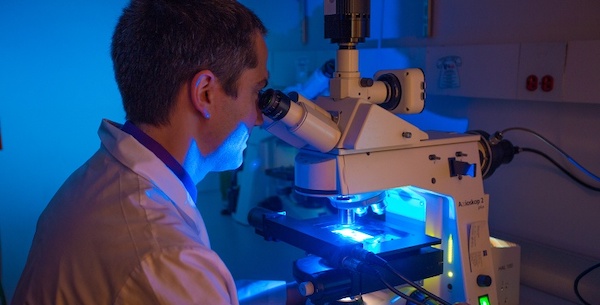Palmer Lab Overview

The Palmer Lab is developing quantitative optical imaging methods for assessing tumor physiology and hemodynamics; developing intravital imaging methods including window chamber models; studying transgenic reporter models for assessing tumor immune response and angiogenesis; and working to make imaging techniques available to other researchers through collaboration and the Optical Molecular Imaging and Analysis shared resource.
Research

Research Overview
There are two major focuses of our research:
- Developing functional optical imaging techniques.
- Applying these techniques to gain a better understanding of cancer progression and treatment response.
Our imaging work centers on the use of optical spectroscopy and hyperspectral imaging to quantify tissue absorption, scattering and fluorescence characteristics of tissue as a means of characterizing tumor physiology, hemodynamics and other functional indicators. The application of these techniques to biological problems centers on assessing the effects of radiation and chemotherapy on tumor physiology, and methods of improving this response. We also have a number of collaborative projects ongoing with other groups and through the Optical Molecular Imaging and Analysis shared resource.
Current Projects
Boron nanoparticles for oxygen sensing: In collaboration with the Fraser Lab at the University of Virginia, we are developing oxygen sensing capabilities using unique oxygen sensitive boron nanoparticles. These have stable blue fluorescence and oxygen-quenched phosphorescence, and so serve as a ratiometric indicator of oxygen tension. Hypoxia, or lack of oxygen is known to inhibit the beneficial effects of cancer therapies, and plays a major role in treatment failure. The goal of this project is to further develop the nanoparticles and imaging methods to enable dynamic imaging of oxygen tension in response to therapy and better understand the role of hypoxia in driving therapeutic response. This project is funded by the National Cancer Institute.
Our other major project is being carried out in collaboration with Dee Gunn, Kingshuk Roy Choudhury, Blanche Capel and Mark Dewhirst at Duke to study the role of myeloid cells in radiation response. It has been shown that chemokine receptor antagonists, particularly against CXCR4 can play an important role in tumor response to radiation and chemotherapy. We are applying imaging techniques to study the dynamics of myeloid cell recruitment and interactions with other cell types to promote angiogenesis and tumor recurrence following radiation therapy. This work is funded by the North Carolina Biotechnology Center.
People
Contact
DUMC Box 3455
Durham, NC 27710
Email Dr. Palmer at greg.palmer@duke.edu.


